Helena Fourment

Helena Fourment or Hélène Fourment (11 April 1614 – 15 July 1673) was the second wife of Baroque painter Peter Paul Rubens. She was the subject of a few portraits by Rubens, and also modeled for other religious and mythological paintings.
Biography
Hélène Fourment was the daughter of Daniël Fourment, an Antwerp silk merchant, and Clara Stappaerts. They had four sons and seven daughters, including Clara (born 1593) and Susanna (1599-1628), who were both also painted by Rubens.[1] Hélène was the youngest of the 11 Fourment children.
Hélène Fourment married Rubens on 6 December 1630, when she was 16 years old and he was aged 53. His first wife, Isabella Brant, had died in 1626. Hélène's brother Daniël Fourment the younger was married to Clara Brant, the sister of Isabella. Daniël Fourment the elder was an art lover and possessed works by Rubens and Jacob Jordaens, and works by Italian masters; he also commissioned from Rubens a series of tapestries depicting the life of Achilles.[2]
Rubens and Hélène Fourment had five children:
- Clara-Joanna, baptized 18 January 1632; she married Phlips van Parys, knight
- Franciscus, baptized 12 July 1633; he married Susanna-Gratiana Charles
- Isabella-Helena, baptized 3 May 1635
- Peter Paul, baptized 1 March 1637, became a priest
- Constantia-Albertina, baptized 3 February 1641; became a nun
After the death of Rubens, Helena started a relationship with Jan-Baptist van Brouchoven, assessor and alderman of Antwerp, who later became Count of Bergeyk.[3] On 9 October 1644 their son Jan van Brouchoven, the later second Count of Bergeyk and one of the most important politicians in the Southern Netherlands of his time, was born, and Helena and Jan-Baptist married in 1645. They had five further children together.
Hélène Fourment was said to be very beautiful, amongst others by the Cardinal-Infante Ferdinand of Austria, then Governor of the Netherlands, stating that she was "undoubtedly the most beautiful one may see here",[4] and by the poet Jan Caspar Gevaerts, a friend of Rubens, who praised "Helen of Antwerp, who far surpasses Helen of Troy".[5]
Paintings
Helena Fourment
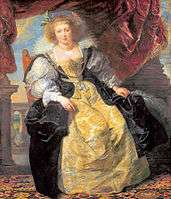 Hélène Fourment, ca. 1630, now in the Alte Pinakothek
Hélène Fourment, ca. 1630, now in the Alte Pinakothek Helena Fourment in wedding dress, detalj
Helena Fourment in wedding dress, detalj- Hélène Fourment with two of her children, ca. 1635, Louvre
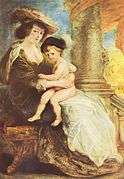 Helena Fourment with her Son Francis, c. 1634-1635, Alte Pinakothek
Helena Fourment with her Son Francis, c. 1634-1635, Alte Pinakothek Portrait of Hélène Fourment, ca. 1638, now in the Museu Calouste Gulbenkian
Portrait of Hélène Fourment, ca. 1638, now in the Museu Calouste Gulbenkian Rubens with Hélène Fourment and their son Peter Paul, 1639, now in the Metropolitan Museum of Art
Rubens with Hélène Fourment and their son Peter Paul, 1639, now in the Metropolitan Museum of Art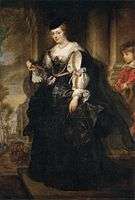 Helena Fourment with a Carriage, 1639
Helena Fourment with a Carriage, 1639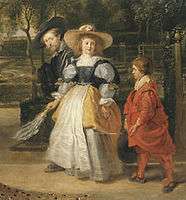 Helene Fourment with her husband and child
Helene Fourment with her husband and child
Portraits
- Helena Fourment in wedding dress, Munich, Alte Pinakothek, 1630-1631; a studio copy of this work is in the collection of the Rijksmuseum
- Pörtrait of Helena Fourment with a glove", Munich, Alte Pinakothek (same as above?)
- Helena Fourment with her eldest son, Frans, 1635, Munich, Alte Pinakothek
- Rubens and Helena Fourment walking in their garden, Munich
- Helena Fourment with her children Clara, Johanna, and Frans, 1636-1637, Louvre
- Helena Fourment and Frans Rubens, Louvre
- Rubens, his wife Helena Fourment, and their son Peter Paul, ca. 1639, Metropolitan Museum of Art
- Portrait of Helena Fourment(?) a studio work in the collection of the Royal Museum of Fine Arts in Brussels
- Portrait of Helena Fourment(?) a 17th-century work from Antwerp, now in the Rubenshuis
Model
- Judgment of Paris, Museo del Prado (the Venus-figure is modelled on Hélène Fourment)
- The Garden of Love, Prado, 1630-1633
- Het Pelsken, 1638, Kunsthistorisches Museum, Vienna
- The Origin of the Milky Way, c. 1637
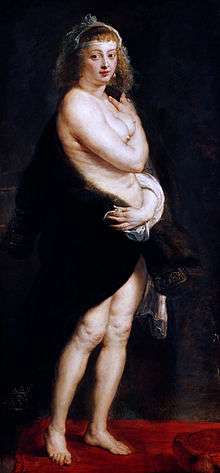
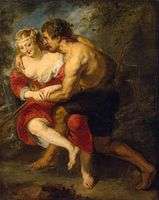 Pastoral Scene
Pastoral Scene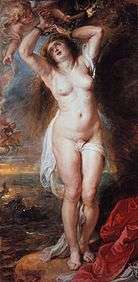
- Venus et Cupid
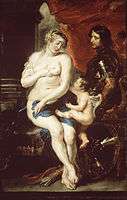 Venus, Mars and Cupid
Venus, Mars and Cupid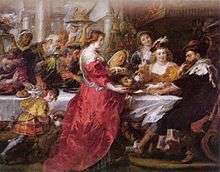 The feast of Herodes and Salome
The feast of Herodes and Salome
 Judgment of Paris
Judgment of Paris
Siblings: Clara van Hecke née Fourment, and Susanna Lunden née Fourment
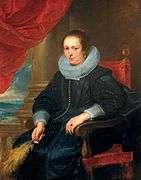 Portrait of a women, possibly Clara Fourment, ca. 1630, now in the Mauritshuis
Portrait of a women, possibly Clara Fourment, ca. 1630, now in the Mauritshuis The Felt Hat, probably a portrait of Susanna Fourment, ca. 1622, now in the National Gallery
The Felt Hat, probably a portrait of Susanna Fourment, ca. 1622, now in the National Gallery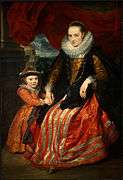 Susanna Fourment and her daughter, 1621, by Anthony Van Dyck, in the National Gallery of Art
Susanna Fourment and her daughter, 1621, by Anthony Van Dyck, in the National Gallery of Art
Notes
- ↑ Fahy, Everett (1973). The Wrightsman Collection. 5. Paintings, drawings. Metropolitan Museum of Art. p. 196. ISBN 9780870990120.
- ↑ Campbell, Thomas Patrick (2010). Tapestry in the Baroque. Metropolitan Museum of Art. p. 28. ISBN 9780300155143.
- ↑ Knackfuss, H. (1904). Rubens. p. 158.
- ↑ Liedtke, Walter A. Flemish paintings in the Metropolitan Museum of Art. Metropolitan Museum of Art. p. 177. ISBN 9780870993565.
- ↑ Néret, Gilles (2004). "The Most Beautiful Woman in Antwerp". Peter Paul Rubens, 1577-1640. Taschen. ISBN 9783822828854.
Further reading
- Brendel, Maria L. (2011). Die Macht der Frau. Rubens` letztes Modell Helene Fourment (in German). Berlin: Parthas. ISBN 978-3-86964-037-2.
- Liedtke , Walter A. (1984). Flemish paintings in the Metropolitan Museum of Art. New York: The Metropolitan Museum of Art. ISBN 0870993569. (see index, v.1; Lunden, Susanna (née Fourment) for information about her daughter)
External links
 Media related to Hélène Fourment at Wikimedia Commons
Media related to Hélène Fourment at Wikimedia Commons
